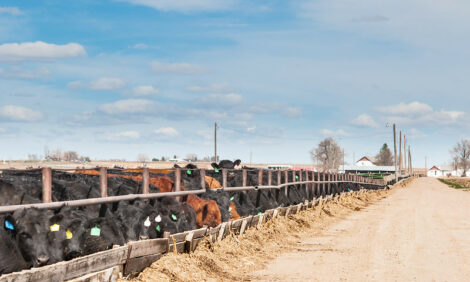



NZ Beef Carbon Footprint Study Highlights Productivity Gains
NEW ZEALAND - The New Zealand beef industry has completed a study examining the full carbon footprint of New Zealand beef, and it highlights significant productivity gains.Beef + Lamb New Zealand General Manager Market Access, Ben O'Brien says the study was driven by the industry's sustainability focus and the dual challenges posed by an increasing global population and pressure on the planet's limited resources.
"We see this study as making a valuable contribution to the global livestock production story and we will be contributing the results of this study to the FAO work programme on environmental performance of livestock food chains."
Mr O'Brien said the New Zealand sheep and beef industry had made enormous progress in reducing its emissions during the last 20 years, mainly by producing more meat from less pasture.
"Less pasture consumed means less emissions. Compared to 1990, New Zealand sheep and beef farms now produce slightly more meat by weight, but from fewer animals."
Researchers estimate that this productivity improvement has reduced the carbon footprint of New Zealand beef and lamb by about 17 per cent over that period, he said.
The study was funded by Beef + Lamb New Zealand, the Meat Industry Association, Ballance Agri-Nutrients and Landcorp, and the Ministry for Primary Industries greenhouse gas footprinting strategy. Much of the data for analysis was supplied by Beef + Lamb New Zealand.
The study has created a benchmark for understanding where greenhouse gas emissions are occurring across the supply chain, including production, processing, transportation and consumption, says Mr O'Brien.
"Differences in the footprint are largely related to the value of the types of cuts that are exported to different markets and the method of allocating emissions on an economic basis.
"As has been reported in a number of other beef carbon footprint studies the majority (over 90 per cent) of emissions occur on the farm."
Mr O'Brien says the footprint varies depending on the type of farm (7.2 to 14.3 kg CO2e per kg live-weight), the sex and age of animals (7.3kg young bull to 16kg breeding cows), and whether or not calves from the dairy industry are used. Overall the weighted New Zealand average GHG emissions from beef animals from sheep & beef farms was 10.5kg CO2e per kg live-weight.
The emissions arising from transport to market are extremely low. Oceanic shipping is very efficient and this study shows it contributes just 1.1 - 2.7 per cent of the total carbon footprint.
Dr Stewart Ledgard, the lead author of the report, said that until there was a globally-agreed methodology for 'footprinting', it was hard to assess how New Zealand's footprint compares to others.
"We're not aware of overseas studies with a comparable scope or level of detail in the methodology."
The New Zealand pastoral industry has also invested in strategic, large-scale research aimed mostly at livestock emissions through the Pastoral Greenhouse Gas Research Consortium, the Global Research Alliance and the New Zealand Agricultural Greenhouse Gas Research Centre.
TheCattleSite News Desk


